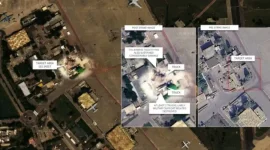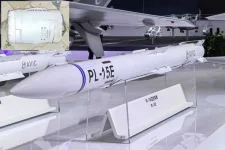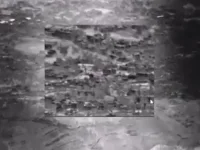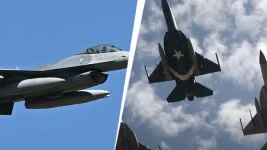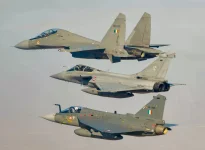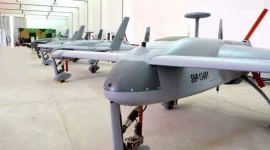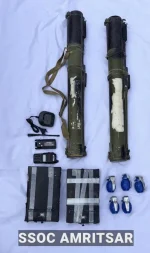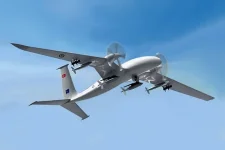Recent India Today report indicate significant Turkish involvement in supporting Pakistan during a recent four-day border conflict with India. This support allegedly included the provision of over 350 drones and the deployment of military personnel to coordinate attacks.
According to the report, two Turkish military operatives were reportedly killed during India’s “Operation Sindoor,” a retaliatory campaign initiated on May 7, 2025. This operation was launched in response to the April 22 Pahalgam terror attack, which resulted in the tragic loss of 26 civilian lives.
Operation Sindoor, conducted by the Indian Armed Forces, targeted terrorist group infrastructure and Pakistan Air Force (PAF) bases. The operation has brought to light the extent of Turkey’s military assistance to Pakistan, which purportedly included coordinating drone strikes against Indian military installations and other critical assets.
In response to these developments, India has reportedly blocked the Turkish state-run broadcaster TRT on the social media platform X (formerly Twitter), and there are growing public calls for a boycott of Turkish goods.
Indian forces initially focused Operation Sindoor on May 7 against nine terrorist camps in Pakistan and Pakistan-occupied Kashmir (PoK) linked to groups such as Jaish-e-Mohammed (JeM), Lashkar-e-Taiba (LeT), and Hizbul Mujahideen. These strikes are said to have eliminated over 100 terrorists, including notable figures like Yusuf Azhar and Mudassar Khadian Khas, and destroyed significant terror infrastructure in locations such as Bahawalpur and Muridke.
The conflict escalated when Pakistan allegedly retaliated between May 8 and May 9, employing an estimated 300 to 400 drones to attack 36 Indian locations, spanning from Leh in the north to Sir Creek in the west. Forensic examination of downed drones reportedly confirmed them to be Turkish-made Asisguard Songar models, which are designed for surveillance and precision strike missions.
The India Today report further claims that Turkey's assistance was not limited to drone supplies. Turkish military advisors were allegedly embedded with the Pakistani Army, aiding in the coordination of these drone attacks. The objectives of these attacks were reportedly to test India’s air defence capabilities and gather intelligence.
The presence and subsequent reported deaths of two Turkish military operatives during Indian counterstrikes are presented as underscoring Ankara's direct and active role in the hostilities. Sources cited in the report suggest that Pakistan is unlikely to officially acknowledge these Turkish casualties due to the sensitive nature of Turkey's alleged involvement.
Turkey’s contribution to Pakistan's military efforts was described as multifaceted. The report states that over 350 drones, including Asisguard Songar and Bayraktar TB2 models, were supplied to Islamabad.
The Asisguard Songar drones can be equipped with various weapon systems, such as 5.56mm assault rifles, 40mm grenade launchers, and 81mm mortar grippers, and were reportedly used for close air support and kamikaze-style attacks against Indian forward positions and supply convoys.
The Bayraktar TB2 drone, which gained prominence in other international conflicts like Nagorno-Karabakh, was said to have provided enhanced surveillance and target designation capabilities for Pakistani forces. These drones are known for their effectiveness in reconnaissance and armed missions.
Beyond unmanned aerial vehicles, other forms of Turkish military engagement were noted. According to the report, six Turkish C-130 transport aircraft were deployed to Pakistan in the period leading up to the conflict, leading to speculation about arms deliveries.
While Turkish officials reportedly denied these claims, stating the aircraft were present for refueling purposes, global air surveillance systems allegedly confirmed their presence in Pakistan.
Additionally, the Turkish naval corvette TCG Buyukada (F-512) docked at Karachi Port on May 5. This was officially described by Pakistan as a “goodwill visit,” but Indian sources reportedly viewed it as a provocative gesture given the heightened tensions.
Turkish advisors are believed to have played a crucial part in operational planning, assisting Pakistani forces in coordinating large-scale drone swarm attacks designed to overwhelm Indian air defence systems.
The reported deaths of the two operatives, thought to be drone operators or technical advisors, during Indian precision strikes—possibly at Pakistani bases like Murid or Bholari—would mark a significant escalation in Turkey’s direct military involvement against India.
In India, public sentiment has reportedly turned sharply against Turkey following these revelations. The hashtag #BoycottTurkey has been trending on X, with many citizens expressing their dismay and recalling India's humanitarian aid to Turkey during the devastating 2023 Turkey-Syria earthquake under "Operation Dost." As part of Operation Dost, India had sent significant relief materials and deployed National Disaster Response Force (NDRF) teams.
In a tangible sign of the backlash, Indian e-commerce platforms such as Flipkart and Cleartrip have reportedly suspended bookings to Turkey. Furthermore, the Udaipur Marble Processors Association is advocating for a ban on Turkish marble imports, which currently constitute a substantial portion (around 70%) of India’s marble supply.

